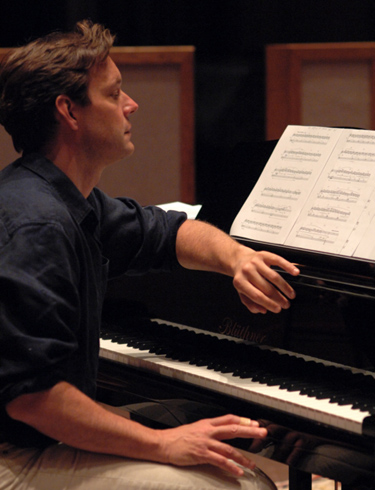
Jake Heggie, Orcas Island Chamber Music Festival’s Composer-in-Residence 2012. Photo courtesy of Art and Clarity
By Margie Doyle
Jake Heggie, Orcas Island Chamber Music Festival’s first Composer-in-Residence in 2005, returns to this year’s festival with two world premiere compositions: the first, a suite for violin/viola and piano, with the working title, Orcas Island Ferry Suite.
The second work, commissioned by the Seattle Commissioning Club, is a baritone/piano trio, This Is My Beloved (poetry by Walter Benton) for baritone Rod Gilfry, commissioned by the Seattle Commissioning Club.
Heggie enthusiastically describes the inspirations and connections that result in his return appearance to the Orcas Island Chamber Music Festival (OICMF): “It all goes back to Aloysia [Friedmann] and Jackie [Jon Kimura Parker]. None of this would happen without such brilliant artists and generous, gregarious people as the driving force.”
After working with Aloysia in the Houston Grand Opera’s production of his chamber opera, The End of the Affair, Heggie was invited to the 2005 OICMF. He describes his first trip to Orcas as “stepping off the edge of the continent to make music with friends.”
His work for the Festival, Before the Storm, set to four poems, was praised by fellow composer and Seattle Times music critic Melinda Bargreen as “lyrical, evocative… downright lovely.” After enjoying “such an amazing, rapturous experience being on Orcas,” Heggie was motivated to create something just for the Festival, and “the stars lined up this summer” for his return engagement.
For Heggie, music composition is a wonderful “crockpot” where time, place, people and poetry “stew” to make a delectable creation.
In Orcas Island Ferry Suite Heggie describes “an ache and anticipation of something magical” through four movements:
- crossing the Salish Sea by ferry;
- the “jangle and jumble of cars and people;”
- the response to people on the island;
- celebration of the adventure.
The suite for violin, viola and piano will be performed during the “Flurry of Violins!” Concerts on August 11 and 12.
In This Is My Beloved, Heggie calls on the poet Walter Benton, whom Heggie met while he was a piano student at UCLA. He found Benton’s poetry “very romantic, physical, visceral and erotic.” Heggie responded to Benton’s poetry so deeply that he proposed working with baritone Rod Gilfrey on the project 15 years ago. “He connected to Benton’s poetry too,” said Heggie, but a joint performance didn’t materialize – yet.
“I have to have a sense of who I’m writing for, and how to connect that with the setting and the poetry, ” Heggie says. Now the time is right, and when he proposed the work to Gilfrey, the baritone accepted immediately.
Next week, Gilfrey will join Heggie and a piano trio, on Center Stage at Orcas to present This Is My Beloved in the “Beloved Music” concerts on August 14 and 15.
Heggie says “ a young composer’s creative ‘bones’ are formed by what they experience growing up. His own musical career has had its share of challenges and satisfaction.
Growing up in Ohio, his dad loved musical theater, his mother favored folk music, his sisters enjoyed pop music, and Jake was immersed in classical music from his piano studies. With his father’s death when Heggie was just 10, he sought comfort in the piano and started composing then.
“I buried myself in the piano. It was mine and it’s never stopped.”
But after studies in Paris and Los Angeles, his performing career as a pianist was disrupted in 1988 — Heggie was just 28 — when a neurological disorder crippled his right hand. He had to learn technique all over again, and despaired of “ever being in music again.”
He moved to San Francisco where he got a “day job” at the San Francisco Opera, preparing marketing materials and managing public relations. There he became acquainted with opera singers Renée Fleming, Sylvia McNair and Frederica von Stade, known familiarly as “Flicka.” (She will be performing at this year’s Festival at the “Orcas~trations” concerts on August 20 and 22.)
After arranging some music for those singers, he entered a competition for art songs and asked Flicka to make a demo art tape. When she agreed, he realized, “This is possible, I could do this. My measuring stick for success is that the people I admired for their artistry and humanity wanted to work with me.”
And after that, says Heggie, “Everything turned around. Theater and voices always influenced me and now it was clear that that was what I needed to do. Within a year, things started falling into place; the General Director of the San Francisco Opera asked me for a mainstage work.
“People don’t realize how powerful their mind is. You learn not to be afraid because you know this is where you belong. Suddenly I was in it again, suddenly I realized I was a theater composer. I found a comfort level with writing and now I can’t believe the amount of music [I’ve composed].”
The first result was the opera Dead Man Walking, based on Sister Helen Prejean’s account of prisoners on death row. For that work, Heggie collaborated with playwright Terrence McNally. Heggie has also collaborated frequently with librettist Gene Scheer, with whom he created “Last Acts,” from a sketch by McNally.
“I’ve always loved the combination of music and words; it’s so transformative,” says Heggie. “And one of the joys of my work is collaborating with living writers. I need a writer who has a great sense of stage and how music can tell things that words can’t – when music goes beyond what words can do.”
He has a fear of being “in a routine” artistically. That has compelled him to take on challenging and dark works, such as End of the Affair, based on a novel by Graham Greene, and Moby Dick, based on Herman Melville’s epic sea story, and To Hell and Back, a retelling of the Persephone myth as a tale of domestic abuse.
“Sometimes that scares me a little; sometime a lot,” Heggie says.
He relies on instinct and intuition to select different sections from original sources, and he gives himself permission to make changes to the source. “I have to find the music behind the words”
A successful response to his work comes when “it is so engaging and the audience is so locked into the journey and poetry that now they are lured back to read the original source. Then I’m really happy because it means a new life for the work.”
(To learn more about Heggie’s appearance with the 15th Annual Orcas Island Chamber Music Festival, go to www.oicmf.org.)
**If you are reading theOrcasonian for free, thank your fellow islanders. If you would like to support theOrcasonian CLICK HERE to set your modestly-priced, voluntary subscription. Otherwise, no worries; we’re happy to share with you.**







